| Author |
Message |
Quinn W.

Location: Bellingham, WA Joined: 02 May 2009
Posts: 197
|
 Posted: Wed 17 Oct, 2012 3:14 pm Post subject: Scabbards with Dagger Sleeves Posted: Wed 17 Oct, 2012 3:14 pm Post subject: Scabbards with Dagger Sleeves |
 |
|
I have seen a couple of modern scabbard makers who will occasionally make a scabbard that has a built-in pocket for daggers, knives or prickers, but I have never seen this sort of thing in historical sources. Does anyone have any info on this design?
And if it does have historical precedent, what date and geographic range it may have appeared in, and what the knife would have been used for (backup weapon, eating utensil, tool for various campsite duties, etc.)
Thanks for your help!
Here is a link to a prop from Lord of the Rings. Obviously not a good historical source, but just to make clear the sort of thing I'm talking about. I've seen it done by more reputable, historically-minded scabbard makers as well: http://www.iloveswords.com/LOTR_scabbard_strider.html
(Sorry if this has already been covered, but I didn't have much luck with the search function.)
"Some say that the age of chivalry is past, that the spirit of romance is dead. The age of chivalry is never past, so long as there is a wrong left unredressed on earth"
|
|
   |
 |
Nathan Robinson
myArmoury Admin


|
 Posted: Wed 17 Oct, 2012 3:24 pm Post subject: Posted: Wed 17 Oct, 2012 3:24 pm Post subject: |
 |
|
Swords with by-knives, prickers, and whatnot mounted in the scabbard can be found all over historical artwork from the 15th and 16th centuries. Dagger scabbards are even more common. I'm not sure how much earlier the examples date because this is more my area of interest. It would seem this was far more common on items of Germanic (and related) origin.
Regarding the use of some of the tools, such as the "pricker", you can read this topic.
Extant examples survive such as this grossemesser recently posted by Blaz Berlec:

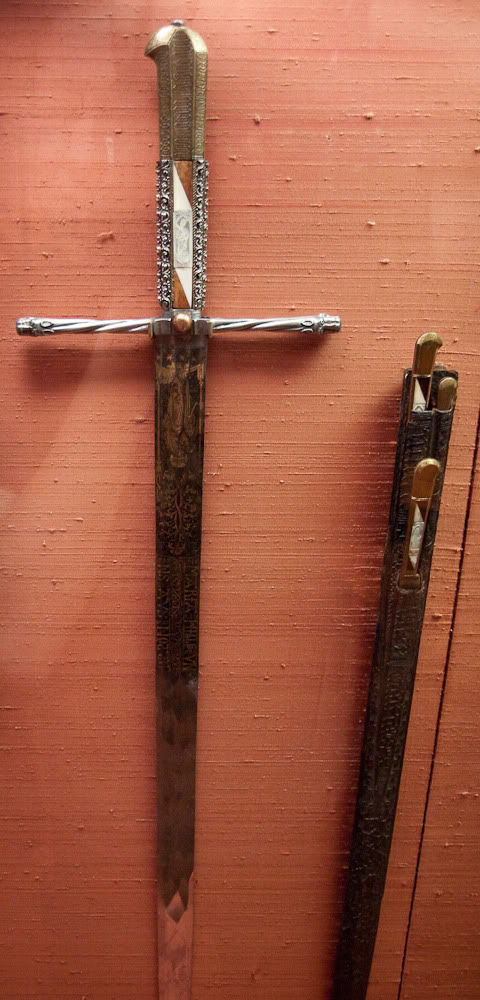
 Attachment: 99.67 KB Attachment: 99.67 KB

A 15th century example found in a Dresden museum
 Attachment: 110.07 KB Attachment: 110.07 KB
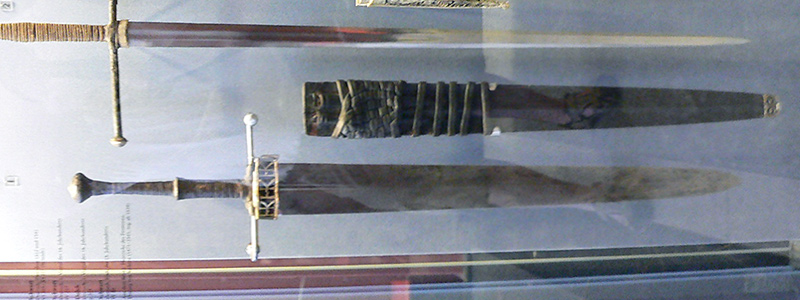
A 16th century example found in a Dresden museum
 Attachment: 113.28 KB Attachment: 113.28 KB

Closeup of the 16th century example found in a Dresden museum
 Attachment: 21.54 KB Attachment: 21.54 KB
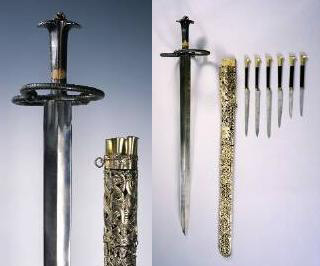
Katzbalger, circa 1525
.:. Visit my Collection Gallery :: View my Reading List :: View my Wish List :: See Pages I Like :: Find me on Facebook .:.
|
|
    |
 |
Jean Thibodeau

|
 Posted: Wed 17 Oct, 2012 5:24 pm Post subject: Posted: Wed 17 Oct, 2012 5:24 pm Post subject: |
 |
|
There is this A&A Ballock Dagger based on a historical one in the Wallace Collection mid 15th century:
http://www.arms-n-armor.com/dagg199.html
Kukris traditionally have these small knives that I think one is used as a small utility knife and the other as a burnisher to restore/maintain a sharp edge: http://www.kultofathena.com/product.asp?item=...fles+Kukri
A Google search for Kukries should give you a lot of examples of originals.
I also thinks that the same idea was used with some tantos by the japanese: Sort of an idea independently arrived at by many cultures at different times and places.
You can easily give up your freedom. You have to fight hard to get it back!
|
|
  |
 |
Nathan Robinson
myArmoury Admin


|
|
    |
 |
|
Scott Woodruff
|
 Posted: Wed 17 Oct, 2012 6:14 pm Post subject: Posted: Wed 17 Oct, 2012 6:14 pm Post subject: |
 |
|
|
There is a bronze Naue II type C sword from Krini that has a knife-pocket on the front of its scabbard. Here is a link to a page with a pic, look about halfway down: http://www.salimbeti.com/micenei/weapons1.htm
|
|
  |
 |
Quinn W.

Location: Bellingham, WA Joined: 02 May 2009
Posts: 197
|
 Posted: Wed 17 Oct, 2012 9:52 pm Post subject: Posted: Wed 17 Oct, 2012 9:52 pm Post subject: |
 |
|
Very interesting. I had no idea it was so prolific. I also didn't expect to see that, from these examples at least, that they seem to come in whole bunches more than just a single knife.
That answers my question pretty definitively, but feel free to keep posting examples. One of the reasons I asked the question is because I've been looking to make or commission a scabbard for my Albion Crecy and I thought it would be a cool feature if it were historical. Looks like it's a bit early to be in vogue but still plausible.
"Some say that the age of chivalry is past, that the spirit of romance is dead. The age of chivalry is never past, so long as there is a wrong left unredressed on earth"
|
|
   |
 |
Nathan Robinson
myArmoury Admin


|
 Posted: Wed 17 Oct, 2012 10:22 pm Post subject: Posted: Wed 17 Oct, 2012 10:22 pm Post subject: |
 |
|
| Quinn W. wrote: | | One of the reasons I asked the question is because I've been looking to make or commission a scabbard for my Albion Crecy and I thought it would be a cool feature if it were historical. Looks like it's a bit early to be in vogue but still plausible. |
I'm not certain that the Crecy would be a good choice for this treatment given its era and origin. Strictly speaking, the combo seems odd to me.
.:. Visit my Collection Gallery :: View my Reading List :: View my Wish List :: See Pages I Like :: Find me on Facebook .:.
|
|
    |
 |
Jean Thibodeau

|
 Posted: Thu 18 Oct, 2012 5:23 am Post subject: Posted: Thu 18 Oct, 2012 5:23 am Post subject: |
 |
|
| Nathan Robinson wrote: | | Quinn W. wrote: | | One of the reasons I asked the question is because I've been looking to make or commission a scabbard for my Albion Crecy and I thought it would be a cool feature if it were historical. Looks like it's a bit early to be in vogue but still plausible. |
I'm not certain that the Crecy would be a good choice for this treatment given its era and origin. Strictly speaking, the combo seems odd to me. |
Yes period, weapon type and context means that although by-knives seem to have been often used in many periods and places it would tend to be used more often with certain weapons and hunting gear and for daily chores.
Small knives with a hunting " trouse " of heavy chopping blade for quartering game plus small knife for skinning and other more delicate work. Small knives as utility tools and even as eating implements in a scabbard holding a dagger or just a bigger multipurpose knife carried also for self defence.
A messer or long messer which was also a civilian weapon might also have it's associated by-knives.
Like Nathan wrote I'm not sure if this is applicable to a war sword ? Maybe with a so-called " side sword " carried in a more civilian context. ( Not impossible but seems improbable with the Crecy or equivalent sword  ) )
You can easily give up your freedom. You have to fight hard to get it back!
|
|
  |
 |
Quinn W.

Location: Bellingham, WA Joined: 02 May 2009
Posts: 197
|
 Posted: Thu 18 Oct, 2012 11:23 am Post subject: Posted: Thu 18 Oct, 2012 11:23 am Post subject: |
 |
|
Actually, that makes a lot of sense. Not much point in strapping a pricker to a war sword. Thanks for steering me right!
"Some say that the age of chivalry is past, that the spirit of romance is dead. The age of chivalry is never past, so long as there is a wrong left unredressed on earth"
|
|
   |
 |
Sean Flynt

|
|
   |
 |
Nathan Robinson
myArmoury Admin


|
 Posted: Thu 18 Oct, 2012 1:12 pm Post subject: Posted: Thu 18 Oct, 2012 1:12 pm Post subject: |
 |
|
| Sean Flynt wrote: | | They're absolutely correct for a war sword. The period is the main consideration. I don't recall seeing any of these depicted for the Crecy period. That doesn't rule them out, of course, but the artwork of that period is typically not as concerned with such fine details. I'll have a quick look at ImaReal and report back. |
Agreed, 100%. There's lots of reasons to have a pircker/by-knife with a war sword including using it as a sharpener and for many other purposes on campaign. Like you, and as I mentioned above, I'm more concerned with the era and origin of the Crecy sword than the type.
| Jean Thibodeau wrote: | | Like Nathan wrote I'm not sure if this is applicable to a war sword ? |
I didn't say that it wasn't appropriate for a war sword. I said I was concerned with era and origin. In other words, the time period and geographical/cultural origin of the sword doesn't seem to fit the generally depicted swords found in artwork or any extant originals with such by-knives in their scabbards that come to mind.
.:. Visit my Collection Gallery :: View my Reading List :: View my Wish List :: See Pages I Like :: Find me on Facebook .:.
|
|
    |
 |
Quinn W.

Location: Bellingham, WA Joined: 02 May 2009
Posts: 197
|
 Posted: Thu 18 Oct, 2012 1:18 pm Post subject: Posted: Thu 18 Oct, 2012 1:18 pm Post subject: |
 |
|
Gosh, what a total blind spot in my knowledge! I don't consider myself too ignorant when it comes to this sort of thing normally, but this is all brand new information to me. I think I'll just stop making assumptions in favor of just sitting back and taking it in.
Thanks again for helping fill in this gap!
"Some say that the age of chivalry is past, that the spirit of romance is dead. The age of chivalry is never past, so long as there is a wrong left unredressed on earth"
|
|
   |
 |
Sean Flynt

|
 Posted: Thu 18 Oct, 2012 1:24 pm Post subject: Posted: Thu 18 Oct, 2012 1:24 pm Post subject: |
 |
|
I can find nothing of this in the ImaReal database before ca. 1460 in any context (messers, swords, daggers, etc). I found a few examples on messers and other short weapons in the 60s and 70s. The swords I'm thinking of are ca. 1500 and later. So, I'm guessing that this originated among hunting weapons in the second quarter of the 15th c., and elite folks found them useful enough in the field that they wanted them incorporated into their war sword scabbards. 1500 seems to be a midpoint, as this is certainly found well into the second quarter of the 16th c. 1450-1550 appears to be a rough guide for adding by-knives to reproduction scabbards.
As for weapon type, by-knives appear to be most common on mid-size weapons, especially messers.
-Sean
Author of the Little Hammer novel
https://www.amazon.com/Little-Hammer-Sean-Flynt/dp/B08XN7HZ82/ref=sr_1_1?dchild=1&keywords=little+hammer+book&qid=1627482034&sr=8-1
|
|
   |
 |
Jean Thibodeau

|
 Posted: Thu 18 Oct, 2012 1:35 pm Post subject: Posted: Thu 18 Oct, 2012 1:35 pm Post subject: |
 |
|
| Quinn W. wrote: | I think I'll just stop making assumptions in favor of just sitting back and taking it in.
Thanks again for helping fill in this gap! |
Agreed I think I was also making " assumptions " so take what I wrote as speculations.
Again speculation: But I think that small by-knives/tools goes well with a dagger that one would have as a constant companion and if one already has a dagger on the belt with a set of smaller knives, it might be redundant to also have by-knives on the sword scabbard ?
On the other hand if one has by-knives with the sword any dagger one would also carry might be the one without the " extras ". 
Period and fashion/custom critical I think.  
( EDITED/ADDITIONAL: I would go with what Sean wrote.  ) )
You can easily give up your freedom. You have to fight hard to get it back!
|
|
  |
 |
Sean Flynt

|
|
   |
 |
Nathan Robinson
myArmoury Admin


|
|
    |
 |
Mark T

|
 Posted: Thu 24 Jul, 2014 8:45 pm Post subject: Posted: Thu 24 Jul, 2014 8:45 pm Post subject: |
 |
|
Here's a nice historical image; I like how the by-knives seem to face outwards / away from each other: Martyrium der Hl. Ursula und der elftausend Jungfrauen, Flügelaltar, Bruneck, 1448, from the wonderful Imareal:
 Attachment: 248.46 KB Attachment: 248.46 KB
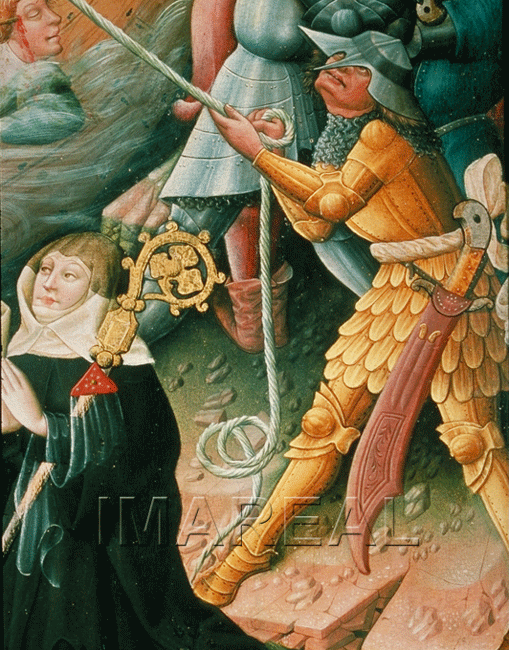
Chief Librarian/Curator, Isaac Leibowitz Librarmoury
Schallern sind sehr sexy!
|
|
  |
 |
Leo Todeschini
Industry Professional

|
 Posted: Thu 24 Jul, 2014 10:32 pm Post subject: Posted: Thu 24 Jul, 2014 10:32 pm Post subject: |
 |
|
Now that is a sword!
Mark T wrote | Quote: | | Here's a nice historical image; I like how the by-knives seem to face outwards / away from each other |
I don't think there is a precedent on how by knives were mounted.
usually the knives are mounted side by side and stay within the width of the sword/large knife and depending on what is in your head decoratively or indeed how the knives sit side by side, you may mount them in any orientation. However it is also still common that the knives may be mounted so that they pockets end up protruding past the outline dictated by the largest blade. If there are more than two by knives, it is common that they are stacked so that you end up with 3 layers of blades in the package.
Tod
www.todsworkshop.com
www.todcutler.com
www.instagram.com/todsworkshop
https://www.facebook.com/TodsWorkshop
www.youtube.com/user/todsstuff1
|
|
   |
 |
Mark T

|
 Posted: Thu 24 Jul, 2014 10:58 pm Post subject: Posted: Thu 24 Jul, 2014 10:58 pm Post subject: |
 |
|
Hi Tod,
I was actually thinking of you as I posted it! Reminds me of my messer from you, and I thought you might like the detailing and form.
I'm not sure if it's artistic licence, but one thing that 'works' about the by-knives (or perhaps by-knife with a pricker with an angulated head?) is that they seem to 'mirror' the curves on the messer/sabre's cross. This kind of mimicry of form is common in various kinds of artwork, as it adds harmony to the piece - but I can see how that principle would also apply if the sword and by-knives were made and mounted in this way also.
Chief Librarian/Curator, Isaac Leibowitz Librarmoury
Schallern sind sehr sexy!
|
|
  |
 |
|
Jens Nordlunde
|
 Posted: Mon 28 Jul, 2014 6:28 am Post subject: Posted: Mon 28 Jul, 2014 6:28 am Post subject: |
 |
|
These 'extra' tools/small knives were also known in India.
The attached katar with scabbard and small knife is an example. The katar is Deccan 17th century and so is the knife. The strange ting is, that the knife was made in London by John Jencks (1576-1628). He got his cutlers mark in London 1606.07, and died in the Tower 1625.
Tools can also be found in side scabbards. A tulwar that I have has two small iwory hilted knives, one on each side. The tulwar is clearly Hindu, as four trisulas can be seen on the hilt alone. Rajasthan 18th century - not shown.
 Attachment: 66.02 KB Attachment: 66.02 KB
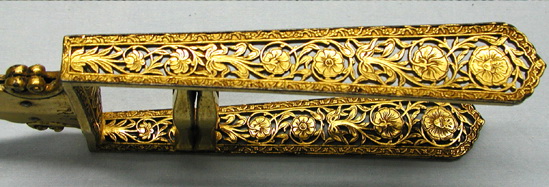
 Attachment: 54.92 KB Attachment: 54.92 KB
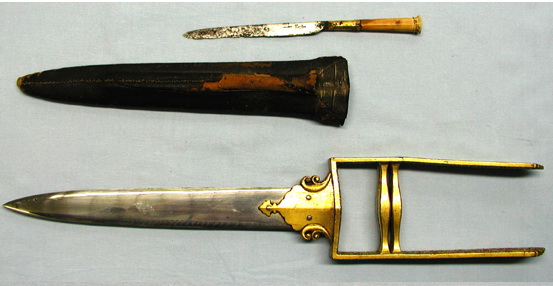
|
|
  |
 |
|
|

